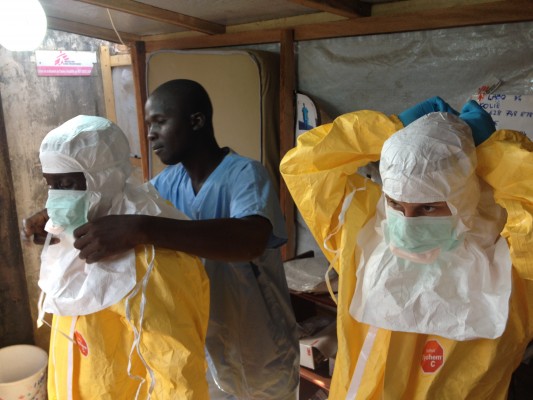The Basics of Ebola with Dr. Van Tulleken
October 8, 2014

Dr. Alexander Van Hoogenhouck-Tulleken, Helen Hamlyn Senior Fellow discusses the Ebola outbreak.
The Observer: President Obama spoke on plans to increase the amount of doctors and training for first responders in West Africa. Do you think this will have a big impact on the current situation?
Dr. Van Tulleken: I do … The Administration’s current response plan seems to be going in the right direction. It’ll require a lot more money and resources than they’ve committed, but it’s a sensible start. The other really striking thing is that the only country that has really stepped up to respond to this is the United States.
The Observer: The Center of Disease Control (CDC) says that there are likely two and a half times as many Ebola cases as are being reported due to people hiding and not seeking treatment. Do you think that the people infected with the disease are in need of education on how to be treated for this?
Dr. Van Tulleken: There are three parts to the Ebola response. One is to treat people who have been infected so that we can isolate them and stop them from spreading the disease further. The second thing is to go into the community and find sick people and treat them. The third thing is education and contact tracing.
The Observer: They’ve been using blood transfusions to fight this disease. How does that work?
Dr. Van Tulleken: So Ebola is a hemorrhagic fever meaning it makes you bleed. And the reason it makes you bleed is that first it makes you clot. And when you clot you use up all your clotting factors – there are agents in your blood, chemicals in your blood that help your blood clot, and once you’ve used up your clotting factors you can’t clot anymore and so you bleed profusely. And so blood transfusions are important for two reasons. The first reason is that you need to replace blood because people are bleeding. The second thing that they’ve been doing is using blood from people who have survived Ebola. The logic behind that is that that blood will have antibodies to fight the disease. We don’t have any idea if that works … It’s a very old fashioned method of treatment, it probably doesn’t work … we just don’t know yet.
The Observer: And we have an experimental drug right now called TKM Ebola, which the Food and Drug Administration (FDA) recently approved. Do you think we’re on our way to finding a cure for this disease?
Dr. Van Tulleken: No, I don’t. It’s very difficult to find a cure. Why it is, I have absolutely no idea. I think the most important part of the response to this epidemic is not going to be waiting around for a drug or a vaccine but acting now to treat cases on the ground, quarantine those people, and educate the population
The Observer: So with the case in Dallas, right now – there’s been one person diagnosed – how well do you think that’ll be contained?
Dr. Van Tulleken: I don’t think there is any risk of there being an epidemic in America. But I think that it is possible that a transmission can occur because he was circulating the community for two days so he’s potentially exposed a hundred people. I think the CDC will be on top of this … that being said, I think the CDC is making a mess of things so far … the CDC did not instruct hospitals clearly enough to contain patients who have come from West Africa with a fever.
The Observer: And should we look to the three doctors who have been cured so far as a sign of hope?
Dr. Van Tulleken: No … I think if you’re looking for hope you should look to Nigeria because if Nigeria can contain it, then it’s proof that it can be done. And the other reason that I’d say we should be optimistic or at least not pessimistic is that so far we’ve done absolutely nothing so anyone that goes “Oh my god this has gotten out of control” is like … well of course it’s out of control because we haven’t tried to control it yet … we’ve really done nothing.
The Observer: I think a lot of people are confused about the disease being contagious when it’s actually infectious.
Dr. Van Tulleken: Right so that is a distinction worth making. If you are exposed to the bodily fluids then you are likely to catch it, but being exposed to the bodily fluids is quite difficult. The main reason for transmission is direct exposure to bodily fluids and that doesn’t happen very often so that is a really good distinction you’re making.









